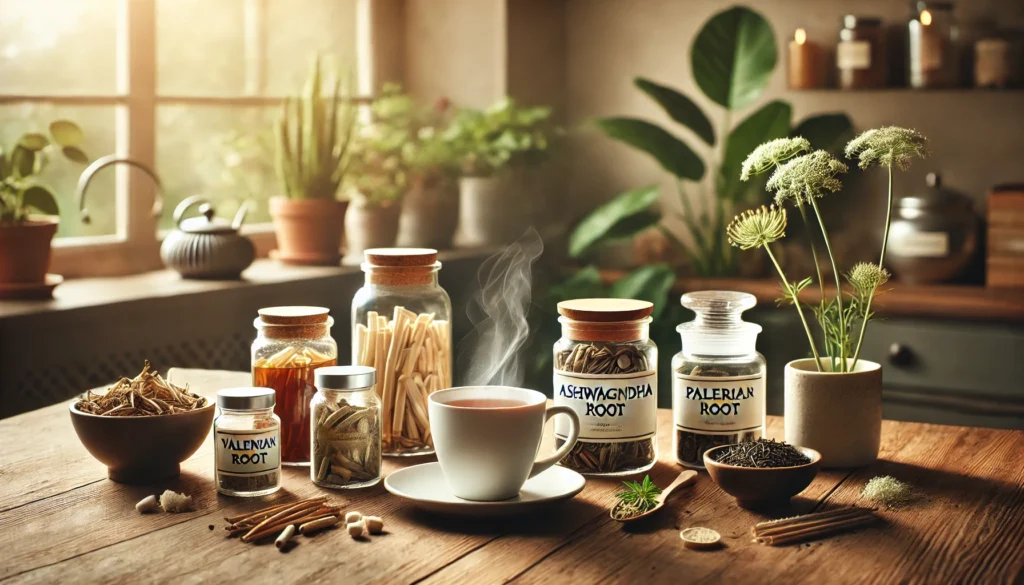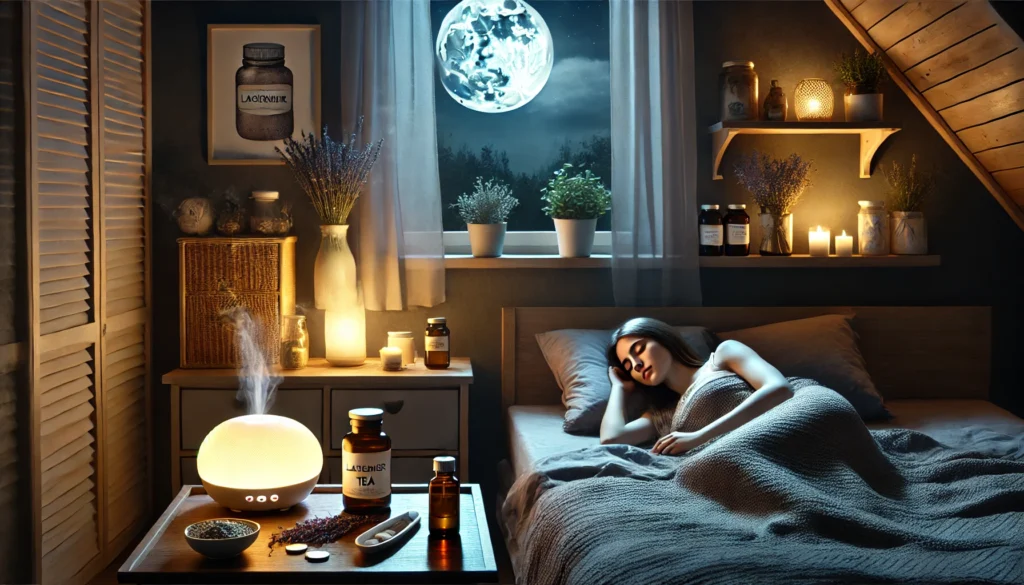The Science Behind Anxious Thoughts and How They Form
To effectively explore how to stop anxiety thoughts naturally, it’s essential to understand how these thoughts arise in the first place. Anxious thoughts are more than fleeting worries; they represent a pattern of cognitive activity that often becomes ingrained through repetition and emotional reinforcement. Neurologically, the amygdala, a small almond-shaped structure deep in the brain, plays a pivotal role in fear-based processing. Over time, neural pathways that support anxiety become strengthened through a process called neuroplasticity. This helps explain why it can feel so difficult to break free from a pattern of anxious thinking—it has become deeply embedded in the brain’s architecture.
You may also like: Best Herbal Alternatives to Anxiolytics: Natural Remedies for Anxiety Relief
Herbal Remedies That May Help Stop Anxious Thoughts
In recent years, there has been a resurgence of interest in herbal remedies as people seek natural ways to manage mental health. Ashwagandha is a well-known adaptogen praised for its ability to modulate the stress response. Passionflower is another standout herb that may increase levels of GABA, a neurotransmitter that promotes relaxation. Lemon balm has been shown to support calmness and cognitive function, particularly during periods of acute stress. Valerian root, while often associated with sleep support, also holds promise for managing anxiety and promoting deep relaxation.

The Role of Adaptogens in Rebalancing the Stress Response
Adaptogens are a class of herbs that help the body resist physical, chemical, or biological stress. They work by modulating the hypothalamic-pituitary-adrenal (HPA) axis and balancing cortisol levels. Rhodiola rosea, for example, is known for its ability to reduce fatigue and improve mental performance under stress. Holy basil, another powerful adaptogen, supports mood regulation and mental clarity. These herbs may be particularly beneficial for those seeking a long-term approach to reducing anxious thoughts.

Nutritional Supplements That Support Mental Clarity
In addition to herbal solutions, certain nutritional supplements can help manage anxiety and improve cognitive function. Magnesium plays a critical role in calming the nervous system and has been shown to alleviate symptoms of anxiety. Omega-3 fatty acids are essential for brain health and have been linked to reduced anxiety in clinical studies. B vitamins, particularly B6 and B12, support neurotransmitter function and help regulate mood. These nutrients work synergistically with herbal remedies to promote a sense of calm and focus.
Frequently Asked Questions: Herbal and Holistic Approaches for Calming Anxiety Thoughts
What role does brainwave entrainment play in managing anxious thoughts naturally?
Brainwave entrainment uses audio patterns, such as binaural beats, to influence brain activity and promote specific mental states like calmness or focus. This technique can be a valuable tool for those learning how to stop anxiety thoughts, especially when practiced regularly. Studies suggest that exposure to theta and alpha frequencies may help reduce overactivity in the brain’s fear circuits. When combined with mindfulness or breathwork, brainwave entrainment offers a non-invasive way to interrupt the loop of intrusive or racing thoughts. While not a cure-all, it provides an innovative and evidence-informed method for training the mind away from anxiety-prone states.
Can aromatherapy support long-term anxiety management beyond immediate relaxation?
Yes, aromatherapy can be more than just a momentary escape—it may have lasting effects on mood and mental clarity. Essential oils like lavender, bergamot, and frankincense have been shown to influence brain chemistry through olfactory stimulation, potentially affecting neurotransmitter activity. When incorporated into a consistent wellness routine, aromatherapy may reinforce emotional resilience and help stop anxious thoughts before they spiral. For instance, pairing essential oils with grounding rituals, like journaling or guided meditation, can help rewire the brain’s association with anxiety triggers. This creates a multisensory coping strategy that aligns with holistic principles of self-regulation.
How does nature exposure influence cognitive patterns related to anxiety?
Spending time in nature has been linked to a significant reduction in rumination—a common symptom for those struggling with how to stop anxious thoughts. Natural settings engage the parasympathetic nervous system, slowing heart rate and easing mental agitation. But beyond calming the body, time in green spaces also stimulates the default mode network in the brain, which governs introspection and self-awareness. Regular walks in forested areas or even urban green zones can serve as a natural “reset,” gradually reducing baseline anxiety levels over time. This makes nature exposure not just soothing but a preventative intervention for chronic anxious thinking.
Are there cultural or ancestral healing practices that align with stopping anxiety thoughts naturally?
Many indigenous and ancestral traditions contain wisdom for managing mental stress that predates modern medicine. Practices like Ayurveda, traditional Chinese herbalism, and African botanical medicine offer diverse approaches to calming the mind. For those exploring how to stop anxiety thoughts, rituals such as chanting, smudging, or ceremonial tea drinking can anchor attention and promote emotional release. These rituals often emphasize connection to the earth, ancestors, or spirit, fostering a sense of belonging that counters the isolation often felt during anxious episodes. Embracing these practices respectfully may enrich one’s toolkit for navigating anxiety through holistic means.
What role does body awareness play in interrupting anxious thought loops?
Developing somatic awareness is a powerful strategy for redirecting anxiety-driven mental chatter. Practices like body scanning, progressive muscle relaxation, and somatic therapy help individuals recognize how their body holds tension and stress. When you learn to identify physical cues of stress early, you can intervene before anxious thoughts take root. This technique supports those learning how to stop anxiety thoughts by anchoring the mind in present sensations rather than future hypotheticals. Over time, increased body awareness can reduce reactivity and foster a more integrated response to emotional discomfort.
Is there a connection between digital overstimulation and increased anxious thoughts?
Yes, excessive screen time—especially on social media—has been linked to cognitive overstimulation and emotional dysregulation. Constant digital input can prevent the brain from fully processing emotions, leading to unresolved tension that fuels anxiety loops. For people wondering how to stop anxious thoughts, reducing digital noise is a crucial step. Setting boundaries, such as screen-free evenings or mindful tech use, can create space for reflection and nervous system recovery. This digital detox approach helps recalibrate your baseline emotional state, making it easier to manage stress naturally.
Can creativity help regulate anxiety in ways that supplements alone cannot?
Engaging in creative expression—whether through art, music, writing, or dance—activates different brain regions than those involved in rumination or fear. Creative flow states interrupt anxious mental loops by immersing attention in meaningful activity. Unlike supplements, which work through biochemical pathways, creativity supports psychological flexibility and narrative re-framing. This makes it an excellent complement for those figuring out how to stop anxious thoughts by engaging the imagination in positive, constructive ways. Over time, creative outlets may become a powerful coping mechanism, especially when practiced consistently.
Are there specific herbal combinations that work synergistically to calm the mind?
Yes, combining certain herbs may enhance their individual benefits, creating a synergistic effect on the nervous system. For example, blending ashwagandha with lemon balm and passionflower may provide both adrenal support and immediate calming effects. These combinations address both long-term stress resilience and short-term relief, supporting those seeking holistic strategies for how to stop anxious thoughts. Herbalists often formulate blends based on individual constitutions, highlighting the importance of personalized care. Consulting a qualified practitioner ensures you’re using combinations that suit your needs and won’t interfere with medications or conditions.
How does sleep quality affect the brain’s ability to manage anxious thinking?
Poor sleep can exacerbate anxiety by impairing executive function and increasing amygdala reactivity. When you’re sleep-deprived, the brain struggles to regulate emotions, making it harder to stop anxious thoughts once they begin. Quality sleep allows the glymphatic system to clear waste from the brain, including stress hormones that accumulate throughout the day. Techniques such as sleep hygiene, magnesium supplementation, and herbal teas like chamomile can help restore healthy patterns. Optimizing rest is one of the most underrated yet essential strategies for building emotional resilience.
What is the long-term outlook for people using natural methods to manage anxiety?
The long-term prognosis for individuals using natural interventions is encouraging—particularly when these approaches are personalized, consistent, and combined with therapeutic guidance. People who integrate lifestyle changes, herbal remedies, and mindfulness practices often report sustained improvements in emotional balance. Learning how to stop anxiety thoughts through holistic tools requires time and experimentation, but it can cultivate lasting internal resources. As research on natural therapies grows, we may see greater integration of these methods into mainstream mental health care. The future of anxiety management may very well lie in an interdisciplinary blend of traditional wisdom and scientific innovation.

Conclusion: A Gentle Path to Peace—How Natural Approaches Help Stop Anxious Thoughts and Reclaim Mental Wellness
Understanding how to stop anxiety thoughts naturally involves a holistic view of mental health that includes the mind, body, and spirit. By incorporating herbal remedies, adaptogens, and supportive nutritional supplements into a balanced lifestyle, individuals may find relief from the constant loop of anxious thinking. These natural tools can serve as gentle yet powerful allies on the journey toward emotional resilience and inner peace. While not a replacement for professional care, they offer meaningful support for those looking to calm the mind and reconnect with a sense of well-being. Embracing a natural approach allows us to honor the body’s wisdom and restore balance in a sustainable, empowering way.
natural anxiety relief, calming herbs for stress, adaptogens for mental health, holistic anxiety remedies, herbal mood support, natural ways to manage stress, supplements for nervous tension, GABA boosting herbs, emotional wellness supplements, plant-based anxiety solutions, non-prescription anxiety support, brain health and nutrition, natural mental clarity aids, herbal support for relaxation, holistic health for anxiety, calming natural therapies, herbal adaptogens for stress, nervous system support supplements, anxiety and gut health connection, herbal support for emotional balance
Further Reading:
How to treat anxiety naturally
10 Natural Ways to Reduce Anxiety
Herbal treatment for anxiety: Is it effective?
Disclaimer
The information contained in this article is provided for general informational purposes only and is not intended to serve as medical, legal, or professional advice. While NewsHealthWatch strives to present accurate, up-to-date, and reliable content, no warranty or guarantee, expressed or implied, is made regarding the completeness, accuracy, or adequacy of the information provided. Readers are strongly advised to seek the guidance of a qualified healthcare provider or other relevant professionals before acting on any information contained in this article. NewsHealthWatch, its authors, editors, and contributors expressly disclaim any liability for any damages, losses, or consequences arising directly or indirectly from the use, interpretation, or reliance on any information presented herein. The views and opinions expressed in this article are those of the author(s) and do not necessarily reflect the official policies or positions of NewsHealthWatch.

